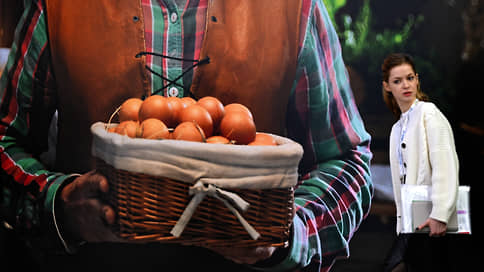Agroholding Tavros became the owner of a producer of edible eggs
[ad_1]

Agroholding Tavros, co-owned by Alfa-Bank this summer, is building up its portfolio of assets in the production of edible eggs. The group has taken control of a poultry farm in the Kirov region, which this year can produce up to 330 million eggs. Restrained price dynamics in the market may contribute to the consolidation of disparate core assets by a large investor, experts say.
The structure of the Tavros agricultural holding in July became the owner of Sovetskaya Agrofirma LLC, a food egg producer in the Kirov region, follows from the Unified State Register of Legal Entities. In 2022, the poultry farm planned to release 265 million eggs, the government of the region reported. This year, according to a Kommersant source in the market, the enterprise should produce 320-325 million eggs.
Tavros told Kommersant that the acquisition of the asset “is in line with the group’s strategy.” The terms of the deal were not disclosed there, but they added that “the buyer and the seller expressed a desire to continue cooperation,” without specifying the details. It was not possible to contact the former owner of the “Soviet agrofirma” Alexei Baramzin “Kommersant”. According to a Kommersant source, after purchasing the poultry farm, Tavros may invest in the construction of a feed mill to provide livestock with their own feed.
The main assets of Tavros are concentrated in Bashkiria. According to its own data, the group manages 117 thousand hectares of agricultural land, produces meat, sugar, and confectionery. Rustem Mirgalimov, managing partner of AVG Capital Partners, owns more than 80% of Tavros Management LLC, Alfa-Bank received 19.01% of the agricultural holding this summer (see Kommersant dated June 29).
The production of edible eggs for Tavros may be a new strategic direction. In 2022, the company “Management of Agricultural Assets”, which is associated with Tavros on the market, acquired for 2 billion rubles. Cherkizovo has the Bashkirskaya poultry farm with a capacity of 750 million eggs per year. Kommersant’s sources also spoke about Tavros’ interest in buying the Komsomolskaya poultry farm in the Perm Territory with a capacity of 650 million eggs per year. This asset is up for auction in May at an initial price of 2 billion rubles. put up the bank “Trust”, but the auction did not take place due to lack of applications.
Conditions for industry consolidation may be appropriate. According to a Kommersant source in the market, many poultry farms specializing in food eggs are experiencing difficulties today. Previously, seasonal price increases during periods of high demand, such as Easter, supported businesses that usually operate with little profitability throughout the year, but this year there were no noticeable price fluctuations, the Kommersant source says. In the first half of the year, egg production increased by 2.5% yoy to 23.3 billion eggs, according to Rosstat. In June, retail eggs cost an average of 77.3 rubles. for 10 pieces. This is about 4.1% more expensive than a year earlier and 2.47% cheaper than in May.
According to Galina Bobyleva, Director General of the Russian Poultry Union, food eggs may be the most affordable source of animal protein today. Meat prices, on the other hand, are on the rise. In June, chilled and frozen chicken in retail, according to Rosstat, cost an average of 193.48 rubles. per 1 kg, which is 6.84% more expensive than the level of May and 2.99% more expensive than June 2022. According to Ms. Bobyleva, rising food prices in general may contribute to the growth of investor interest in agribusiness. According to Kommersant’s sources, several poultry farms specializing in the production of eggs in different regions have been put up for sale today.
Agrifood Strategies President Albert Davleev notes that the Russian food egg market is stable and conservative, except for seasonal fluctuations in demand. According to him, unlike other countries, in Russia this industry is very fragmented and consolidation will require long-term investments. But, the expert believes, by gathering under the control of poultry farms in several regions, you can get better conditions for distribution from federal networks, and in the future – invest in the development of deep egg processing. According to him, the demand for such products (liquid eggs, dry mixes, etc.) in the food industry is high.
[ad_2]
Source link





